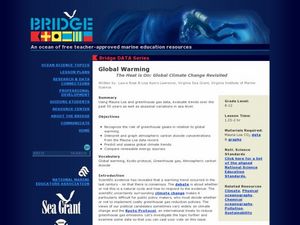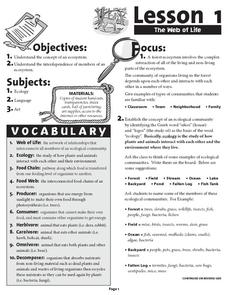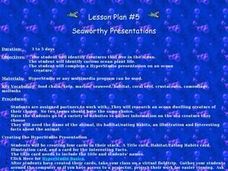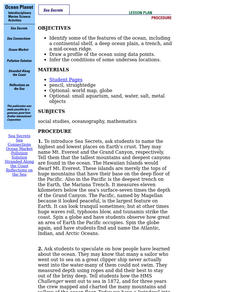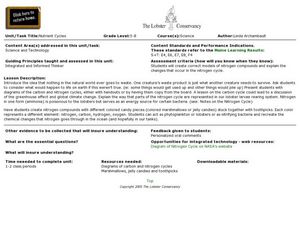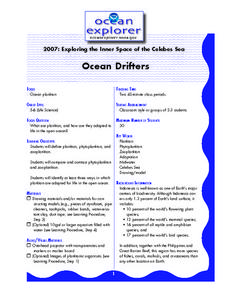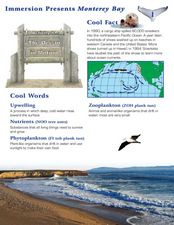Curated OER
How Harmful Is It?
Students complete a form that requires them to make decisions about how severely different types of marine debris affect people, animals, vessels, communities. Results are totaled and analyzed to determine which types of marine debris...
Curated OER
Global Warming - The Heat is On: Global Climate Change Revisited
After listening to your lecture on climate change, young scientists access NOAA's database listing Mauna Loa's carbon dioxide data. They graph the monthly means and then compare their graphs to NOAA's. This is a concise plan that could...
California Academy of Science
Coral Reef Habitat Match
Different animals live in different habitats, and each animal has specifically adaptive traits that make them tailor-made for their environments. This is true on land and in the ocean. Little ones examine how various marine animals have...
Curated OER
Big Fleas Have Little Fleas
A benthic habitat hosts a vast collection of organisms and its structure influences the biodiversity. Middle-school marine biology explorers will discuss how corals impact structure, and therefore diversity, on the ocean floor. They draw...
Polar Trec
Rings of Life
Individuals analyze tree rings to determine the health of an ecosystem. They then look at otoliths of fish, hard calcium carbonate structures located behind the brain, in the same manner.
Curated OER
It's a Gas! Or is it?
Oceanography enthusiasts are given a series of thought experiments to consider in order to relate the solubility of gases and solids to underwater volcanoes. It is not particularly engaging to perform these thought experiments. Choose...
Marine Institute
Water Pollution
Sixth graders investigate the various types of pollutants found in water and ways to help prevent water pollution. Through a hands-on experiment, students create samples of polluted water by mixing water with vegetable oil, dirt,...
Curated OER
People and the Ocean
Young scholars view a demonstration of the ocean and what we can do to help it, and also identify seafood items that students would order on a menu. In this ocean lesson plan, young scholars learn how people are connected to the ocean...
Curated OER
Do Fish Clean the Ocean?
Students analyze a reading selection. In this ocean lesson, students read a story about the ocean, ocean animals and coral reefs. Students have the option to complete internet research on coral reefs. Students write in their journals...
Curated OER
The Web of Life
Middle schoolers participate in a game in which they discover the balance of life in the ocean. They identify different organisms that rely on different types of food. They answer questions to complete the lesson.
Curated OER
Seaworthy Presentations
First graders research ocean animals and plants on the web. In this ocean habitat lesson plan, 1st graders prepare a multimedia presentation. Students will work on their presentations in pairs and every group should have its...
Curated OER
Start at the Very Beginning
Young scholars explore ocean ecosystems. In this cross curriculum art and oceans lesson plan, students create a collage featuring three-finger algae using sand paper, tissue paper, and construction paper.
Curated OER
Ocean Planet: Sea Secrets
Students identify ocean features and draw a profile using data points on a map. Through discussion and research, they discover the importance of oceanography and plot a profile of the ocean floor in search for a vessel full of precious...
Curated OER
Oceans and Coasts
Students explore the topic of marine pollution. They define key vocabulary words, list examples of marine pollution, complete a true/false handout, read an article, and participate in a class discussion.
Curated OER
The Nutrient Cycles
Students investigate the circle of sea life by creating nitrogen compound models. In this oceanography lesson, students discuss sea creatures and where their waste goes. Students identify nitrogen cycles in the ocean by...
Curated OER
City Life In Europe
Students explore Paris. In this geography skills lesson, students watch "City Life in Europe," and conduct further research on the city of Paris and the country of France. Students create postcards that feature Parisian landmarks.
Alabama Learning Exchange
Diverse Life Forms of the Ocean
High schoolers recognize marine organisms and differentiate between plankton and nekton. In this investigative instructional activity students create a concept map using their list of terms and study marine life forms.
Curated OER
Oceanography: Understanding the Relationship Among Ocean Food Chains
Fourth graders explore relationships among organisms involved in ocean food chains to investigate interdependence of the organisms.
Curated OER
Ocean Drifters
Students define terms, and identify three ways in which plankton are adapted for life in the open ocean. In this ocean drift lesson students design a planktonic organism.
Curated OER
Ocean Careers Investigation
Pupils gather information about different careers of the Ocean Adventures expedition team. In this career studies lesson plan students work in groups, read an interview with an Ocean Adventurer, and see the importance of working in...
Alabama Learning Exchange
The Ocean Floor
Learners explore the ocean in this earth science lesson. They use the Internet to gather information on parts of the ocean including the beach, ocean floor, continental shelf, trenches, and the animals that inhabit these parts.
Curated OER
Monterey Bay
Students read background information about Monterey Bay, California, and conduct related experiments. In this ocean in motion instructional activity, students read information about the location, wildlife, and characteristics of Monterey...
Curated OER
Egg Carton Lobsters
Who doesn't love learning about the ocean? And who wouldn't want to help create an ocean themed mural? Little learners make lobsters out of recycled egg cartons, pipe cleaners, and paint. These are then used as part of a larger 3-D ocean...
NOAA
Plate Tectonics II
Mid-ocean ridges, rift valleys, island arcs, mountain ranges, earthquakes, volcanoes ... there are so many features associated with plate tectonics. The 14th installment of a 23-part NOAA Enrichment in Marine sciences and Oceanography...



